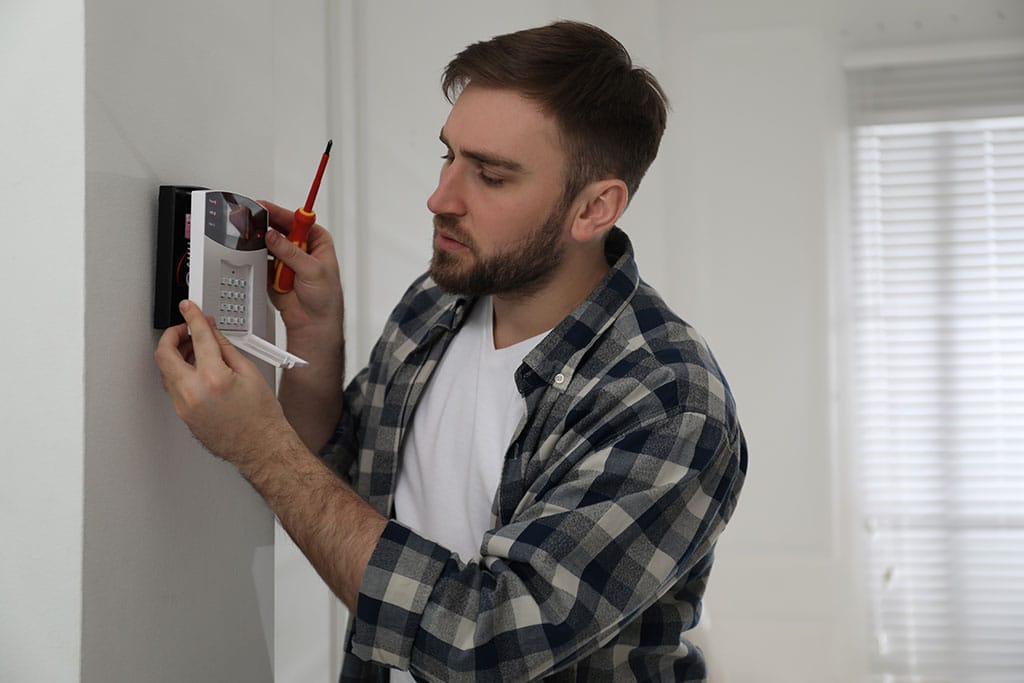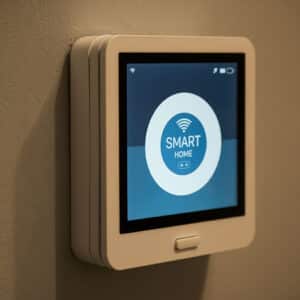Don’t be scammed by the simplicity of DIY security systems. While they’re marketed as an affordable and user-friendly solution, these enticing strategies have hidden risks that could significantly affect your alarm installation business. With the DIY setup on the rise, professionals in the industry face increasing competition, liability challenges, and the potential for lost clients.
As more homeowners opt for DIY systems, alarm installers find themselves navigating a profound market. Consumer expectations for low-cost, easy-to-install devices often clash with the reality of system failures, false alarms, and inadequate protection. These performance gaps open up significant risks for professionals tasked with integrating or servicing DIY systems.
The developing industry of DIY security and its new and unique liability risks open alarm installers a necessity to find the right insurance that can protect your business from these emerging threats.
The Shifting Landscape of Home Alarm Security
DIY Disruption
As DIY security systems continue to reshape the home security industry, professional alarm installers must adapt to new challenges. With the rise of affordable, do-it-yourself options, consumers are increasingly turning to DIY solutions for home protection.
According to research from CNET, over one-third of security systems purchased in 2020 were DIY, signaling a shift in market trends. Brands like Ring and SimpliSafe dominate the market, offering products that claim to be as effective as professionally installed systems.
However, this disruption is creating an uneven playing field for traditional installers, who must now compete with the allure of simplicity and cost savings offered by DIY systems.
Consumer Expectations vs Reality
While DIY systems promise ease and affordability, the reality often falls short of expectations. Many homeowners expect these systems to be as reliable as professionally installed options, but they’re frequently disappointed by system malfunctions, false alarms, or incomplete coverage.
Insights from Brilliant Brand Business reveal that although DIY systems like Front Point Security and GetSafe offer some intelligent features, they often lack the comprehensive security provided by professional installations. These gaps create opportunities for professional installers to step in and offer enhanced services that DIY systems can’t match, such as 24/7 monitoring and tailored maintenance plans.
Impact on Professional Installers
The DIY trend has disrupted consumer buying habits and affected the business models of professional alarm installers. As DIY solutions gain popularity, demand for professional services has seen a dip, with installers having to justify their higher costs through superior service and reliability.
This DIY trend is particularly attractive to younger, tech-savvy homeowners who prioritize convenience over long-term security. As a result, professional installers must focus on educating potential customers about the hidden costs of DIY systems and positioning themselves as a reliable alternative.
Liability Risks Unique to the Alarm Installation Industry
With DIY security systems on the rise, professional alarm installers are now facing unique liability risks. While many installers are being asked to integrate these systems into existing setups, doing so can expose them to more significant legal and operational challenges, especially since DIY systems often fall short of industry standards.
Integration with DIY Systems
Integrating DIY systems into a professional setup presents a range of liability issues for alarm installers. Since these systems may not meet the same industry standards as professionally installed security equipment, any failure or malfunction could lead to potential lawsuits.
Installers who work with DIY systems may be held responsible for technical problems they didn’t cause. An article from The Alarm Masters highlights how DIY systems often lack professional-grade safeguards, leaving security gaps that installers may be blamed for. This creates a precarious situation where installers must ensure that they clearly define their responsibilities when working with DIY components.
System Failure and Malfunction
One of the biggest risks alarm installers faces when dealing with DIY systems is the potential for system failures or malfunctions. Many DIY security systems, while marketed as dependable, have a higher chance of false alarms or failed detection, which could lead to devastating consequences like undetected break-ins.
WorldStar Security says these failures compromise security and may result in homeowners holding installers accountable for any damage or loss. This risk is heightened when DIY systems are connected to professional installations, as any issue is likely to be attributed to the installer, regardless of the system’s origin.
Vicarious Liability
In hybrid setups where DIY and professional systems coexist, vicarious liability can become a major issue. Vicarious liability is a type of liability that arises when one party holds some responsibility for the unlawful or reckless actions of another.
Clients may not distinguish between professionally installed components and DIY additions, assuming that any system failure is the installer’s responsibility. This misunderstanding can lead to legal disputes and damage an installer’s reputation, especially in cases where the DIY system fails to perform.
False alarms are a common issue. They can further exacerbate the problem by triggering legal repercussions against installers who have no control over the DIY system’s reliability. Each false alarm requires a police department to commit two officers to investigate the call and usually takes 20-30 minutes to clear. Responding to these false alarms costs police departments an estimated $1.5 billion dollars annually.
Insurance Solutions for Alarm Installers
As DIY security systems’ risks continue to grow, alarm installers must ensure they are protected from the legal and financial consequences of system failures, integration issues, and data breaches. Specialized insurance solutions can shield installers from liability when things go wrong, offering a critical layer of protection.
Professional Liability Coverage
Professional liability insurance is essential for alarm installers, particularly when dealing with DIY systems that may not meet industry standards. This coverage protects installers from legal claims if a system they installed or integrated fails to perform as expected.
Professional liability insurance can cover lawsuits related to faulty installations or system malfunctions that result in financial losses for the client. This is especially important when working with hybrid setups where installers could be held responsible for issues arising from DIY components.
Errors and Omission Insurance
As highlighted by Business, E&O insurance provides an extra layer of protection by covering claims of negligence or inadequate service. This is particularly crucial for alarm installers when dealing with DIY systems, as any oversight or perceived failure during installation or service could lead to costly legal battles. It covers legal fees and settlements if a client sues for unsatisfactory work, ensuring that installers are financially protected even in complex DIY systems cases.
Cyber and Data Breach Coverage
For installers working with smart or connected security systems, cyber liability insurance is an increasingly vital component of their coverage. DIY systems often rely on internet connectivity, making them more vulnerable to hacking and data breaches.
Forbes explains that cyber liability insurance can cover costs related to data breaches, including legal fees, notification expenses, and even public relations efforts. Installers involved in integrating smart systems can benefit greatly from this protection, especially when dealing with customer data and interconnected devices prone to cyber threats.
The Future of DIY Security and Professional Installations
As the DIY security market continues to grow, professional alarm installers can adapt by finding opportunities within the trend, like:
Embracing Hybrid Security Models
Rather than viewing DIY systems as pure competition, alarm installers can incorporate hybrid solutions that combine DIY products with professional-grade services like monitoring and maintenance.
For instance, an installer could offer to integrate a client’s DIY system into a broader, professionally monitored security network. This allows customers to enjoy the affordability of DIY systems while benefiting from the reliability of professional oversight, ultimately expanding the installer’s service offerings.
Innovating Within the Industry
To stay ahead, installers should focus on innovation by developing new services that cater to the growing DIY market. Offering services such as system consultations, troubleshooting packages, or security audits specifically tailored to DIY setups can create additional revenue streams.
These services provide value to clients who are invested in DIY solutions but still need professional guidance, helping installers maintain a strong foothold in the industry.
Insurance as a Competitive Advantage
Specialized insurance is not just about protection—it can also be a marketing tool. Professional installers who carry comprehensive liability, E&O, and cyber coverage can use this as a selling point when attracting clients who might be on the fence between DIY and professional services.
Demonstrating that they are fully insured against all potential risks, installers can instill confidence in their clients, showcasing their professionalism and accountability in a competitive market.
Conclusion
As DIY security systems continue to gain traction, professional alarm installers face new challenges and opportunities. Only by understanding the risks posed by these systems and implementing best practices can you protect your business from liability and capitalize on the demand for hybrid solutions. Offering innovative services and ensuring you have the right insurance in place will safeguard your operations and provide added value to your clients.
Don’t leave your business vulnerable to the risks of DIY systems. El Dorado Insurance offers tailored insurance solutions designed to protect alarm installers from the unique liabilities they face.
With over 50 years of experience, El Dorado can help you secure the right coverage to keep your business safe and competitive. Contact El Dorado Insurance today to learn more about how their specialized policies can safeguard your alarm installation business. For more information, start your quote with El Dorado Insurance.






